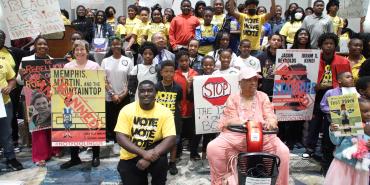Culture wars harm education
Nowadays I am the president of a union, but I am harking back to my years as a civics teacher as I write this column. Governors and education officials in Florida and other states are doing exactly what extremists baselessly accuse educators of doing—imposing their ideological agenda on public schools, rewriting history, stifling free expression and creating intolerance. Such threats are increasing throughout the country, but the education culture wars in Florida are especially dangerous, and they are growing along with its governor’s political ambitions.
Much has been written about Florida Gov. Ron DeSantis’ war on what he calls “woke ideology.” He is presiding over an orgy of laws, bans and threats—censoring books; barring students’ access to Advanced Placement African American studies and threatening to prohibit all other AP courses; banning diversity, equity and inclusion efforts; targeting the LGBTQ+ community; waging a conservative takeover of higher education in the state; limiting what schools can teach about race and racism; demanding that publishers edit social studies textbooks to sanitize history, including omitting references to topics such as the Black Lives Matter movement and the murder of George Floyd, and eliminating content that incorporates social-emotional learning, which is now banned in Florida. But what impact is all this having?
Longtime journalist Steven Greenhouse spoke with teachers throughout Florida for a piece in the Guardian last week and found that intimidation—and its chilling effect—is the point of DeSantis’ efforts. Vivian Taylor, a seventh-grade teacher in Miami, was told to scarcely discuss the lynching of Emmett Till in her civics classes so as not to run afoul of Florida’s “Stop WOKE” law. Carol Cleaver, a middle school science teacher in Pensacola, worries she’ll violate the so-called Don’t Say Gay law if she tells students in crisis about a support hotline for LGBTQ+ students. Brandt Robinson, a high school history teacher in Palm Harbor, said, “Everything we do as teachers to promote critical thinking is undermined by what (officials) are doing.”
You may have seen photos of school libraries in Florida with every book removed and classroom bookshelves covered by tarps and signs warning, “Books are NOT for student use!!” DeSantis’ Department of Education has threatened teachers and librarians with felony prosecution, with punishments of up to five years of prison and a $5,000 fine, for giving students access to books it later decides were inappropriate. And he’s trying to crush teachers unions in Florida, so educators will be on their own in this Orwellian environment. He is using children and educators as pawns in service of his political ambitions.
DeSantis’ press secretary recently tweeted, “The political indoctrination of children through the K-12 public education system is a very real and prolific problem in this country. All CAUGHT & all FIXED under @GovRonDeSantis’ watch.” But as history teacher Brandt Robinson said in the Guardian, the DeSantis administration is “modeling the kind of indoctrination they’re so fast to accuse other people of.”
It’s not just Florida, of course. Over the last three years, legislators in 45 states proposed hundreds of laws placing public schools at the center of culture wars—and leaving teachers teaching on eggshells.
It is impossible for teachers to do their best work—to answer students’ questions fully and accurately, to help them understand context and to consider different viewpoints—if they are rightfully worried that doing so could get them fired. This is what happens in autocracies, not democracies.
My AP government students routinely debated significant historical and current events. I don’t think we could do that if I were teaching in Florida today. Could we debate what changed—and what didn’t—in the 55 years between Bloody Sunday in Selma, Ala., and George Floyd’s murder in Minneapolis? Or compare the policies of the Trump and Biden administrations? Or address any number of topics that interest students? Educators want young people to think critically and think for themselves. We want students to learn about both our nation’s achievements that make us proud and the failings that make us strive to do better. That is becoming impossible in Florida.
Sixty-nine years ago this week, the American Federation of Teachers filed an amicus brief in the U.S. Supreme Court in support of the plaintiffs in Brown v. Board of Education—the only union and education organization to do so. The case embodied the hopes of innumerable Americans seeking justice and equity, and while the United States has yet to fully achieve those goals in education and society, we have made great progress. But that progress is imperiled at this moment by extremist forces working to reverse advances made since the civil rights era, to erode the quality of education our children receive, and to use public schools for their political and ideological goals.

